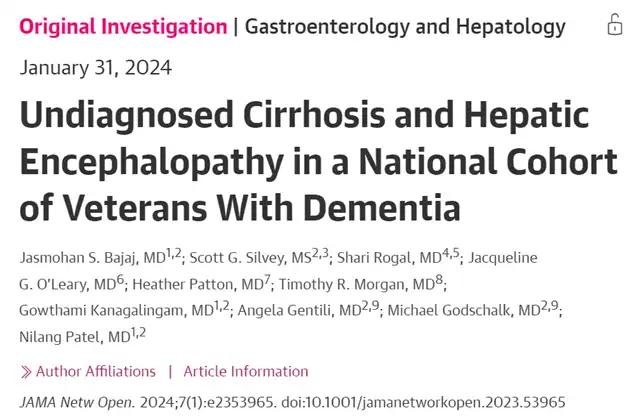10% of dementia symptoms may be reversed by treating liver disease
- Normal Liver Cells Found to Promote Cancer Metastasis to the Liver
- Nearly 80% Complete Remission: Breakthrough in ADC Anti-Tumor Treatment
- Vaccination Against Common Diseases May Prevent Dementia!
- New Alzheimer’s Disease (AD) Diagnosis and Staging Criteria
- Breakthrough in Alzheimer’s Disease: New Nasal Spray Halts Cognitive Decline by Targeting Toxic Protein
- Can the Tap Water at the Paris Olympics be Drunk Directly?
10% of dementia symptoms may be reversed by treating liver disease
- Should China be held legally responsible for the US’s $18 trillion COVID losses?
- CT Radiation Exposure Linked to Blood Cancer in Children and Adolescents
- FDA has mandated a top-level black box warning for all marketed CAR-T therapies
- Can people with high blood pressure eat peanuts?
- What is the difference between dopamine and dobutamine?
- How long can the patient live after heart stent surgery?
10% of dementia symptoms may be reversed by treating liver disease
According to the World Health Organization, over 55 million people worldwide suffer from dementia, and the number of patients increases by nearly 10 million every year.
Dementia is currently one of the leading causes of disability and the need for care among the elderly.
When we think of dementia, we may think of neurodegenerative diseases such as Alzheimer’s disease.
Current treatments can only alleviate symptoms or slow the progression of the disease, but cannot reverse the symptoms of dementia.
However, recent research has found that up to 10% of dementia patients’ symptoms may be due to undetected liver disease. More importantly, these liver-related brain symptoms may be reversed through treatment!

In this study, a team of scientists led by Virginia Commonwealth University reviewed data from nearly 200,000 patients diagnosed with dementia in the Veterans Health Administration database between 2009 and 2019. These patients were diagnosed with dementia at least twice, but were never diagnosed with cirrhosis of the liver.
Cirrhosis of the liver is the production of liver fibrosis and scar tissue due to liver damage, which may be caused by various liver diseases such as non-alcoholic fatty liver disease and viral hepatitis, inhibiting the normal functions of the liver. However, in many cases, cirrhosis of the liver has no obvious symptoms in the early stages, making it difficult to detect.
The key link between cirrhosis of the liver and dementia is that about 50% of cirrhosis patients will experience brain disorders called hepatic encephalopathy. In these patients, due to the lack of liver function, toxic substances that should have been metabolized and removed by the liver accumulate in the blood and enter the brain. Symptoms include cognitive impairment, drowsiness, changes in personality and behavior, and emotions. In the elderly, the diagnosis of hepatic encephalopathy is difficult because its initial symptoms may be attributed to dementia.
In this study, scientists used an evaluation method called the Fibrosis-4 score (FIB-4) to measure the risk of dementia patients having cirrhosis of the liver. They found that although they had never been diagnosed with cirrhosis of the liver, 5.3% of patients had a FIB-4 score of more than 3.25, meaning they were likely to have cirrhosis of the liver. Moreover, up to 10.3% of patients had a FIB-4 score of more than 2.67, meaning they may have late-stage liver fibrosis.
Jasmohan Bajaj, MD, a medical professor at Virginia Commonwealth University and provider at Richmond VA Medical Center, the first author of the article, said in an interview with STAT, an industry media outlet, that if some of these patients’ dementia symptoms are caused by hepatic encephalopathy, then their treatment will be much easier than treating dementia! This is a direction worth further investigation.
Currently, the main treatment methods for hepatic encephalopathy include lactulose: it is an orally administered synthetic sugar that can act as a laxative, speed up food passage through the intestines, and reduce the amount of ammonia absorbed by the body. In addition, doctors may prescribe antibiotics that are orally administered but not absorbed by the intestines (such as rifaximin). These antibiotics that stay in the intestines can reduce the bacteria and toxins produced during the digestive process. After treatment, hepatic encephalopathy can usually improve and complete recovery is also possible.
The researchers also pointed out some shortcomings of this study in the article, including that the use of the FIB-4 score can only predict the risk of cirrhosis of the liver, and more tests are still needed for diagnosis. Moreover, many patients in this study may have both dementia and hepatic encephalopathy, so treating hepatic encephalopathy may not completely reverse cognitive impairment and other brain symptoms. However, Dr. Bajaj said that the unexpected link between dementia and liver health emphasizes that patients should be screened comprehensively when treating dementia patients. If cirrhosis of the liver can be detected earlier, it may reveal the reversible cause of cognitive impairment and improve the lives of these patients more effectively.
10% of dementia symptoms may be reversed by treating liver disease
References:
[1] Some dementia patients might have reversible symptoms caused by cirrhosis, study says. Retrieved January 31, 2024
[2] Study finds 1 in 10 veterans diagnosed with dementia may instead have cognitive decline from cirrhosis. Retrieved January 31, 2024
[3] Bajaj et al., (2024). Undiagnosed Cirrhosis and Hepatic Encephalopathy in a National Cohort of Veterans With Dementia. JAMA Network Open, doi:10.1001/jamanetworkopen.2023.53965
[4] Dementia. Retrieved January 31, 2024
[5] Hepatic encephalopathy. Retrieved January 31, 2024
(source:internet, reference only)
Disclaimer of medicaltrend.org
Important Note: The information provided is for informational purposes only and should not be considered as medical advice.



